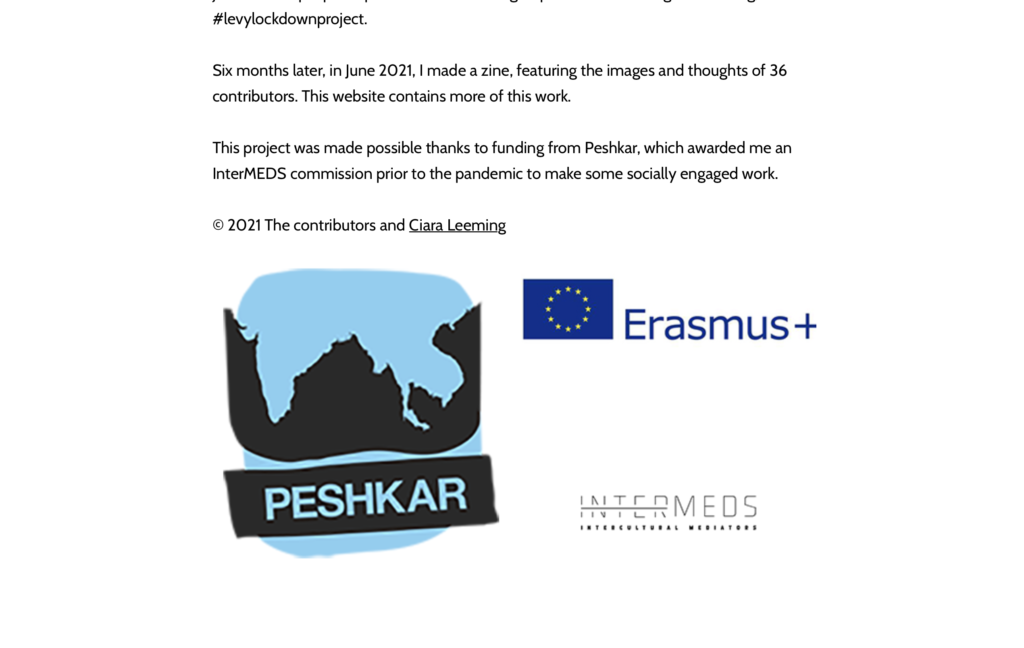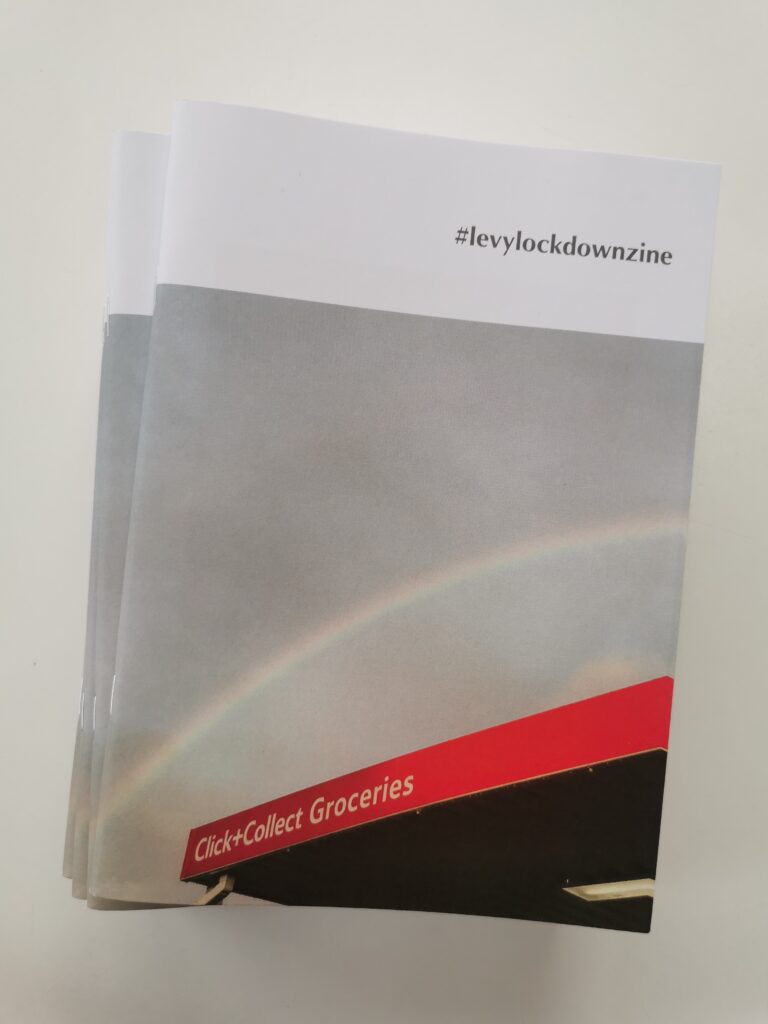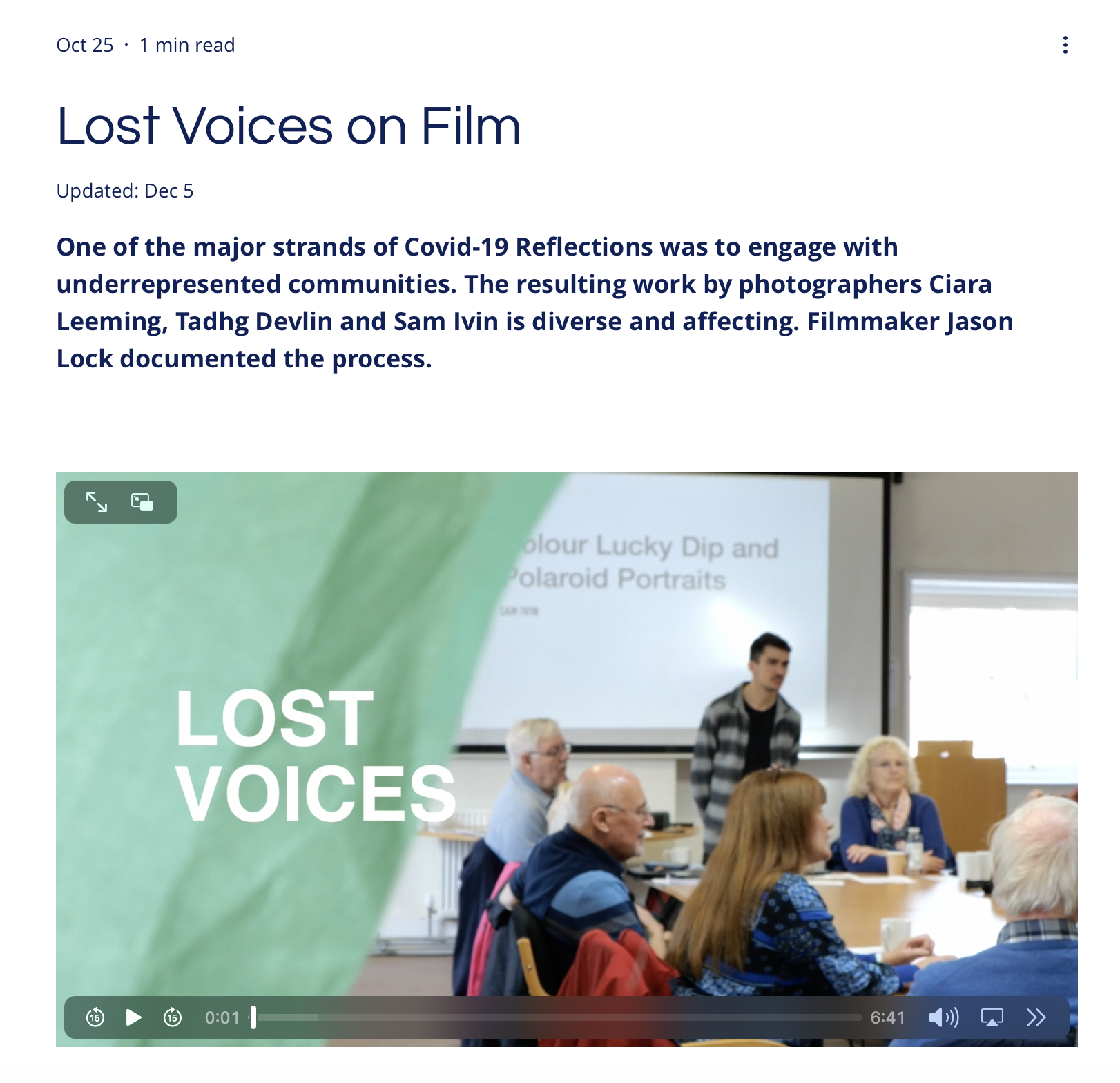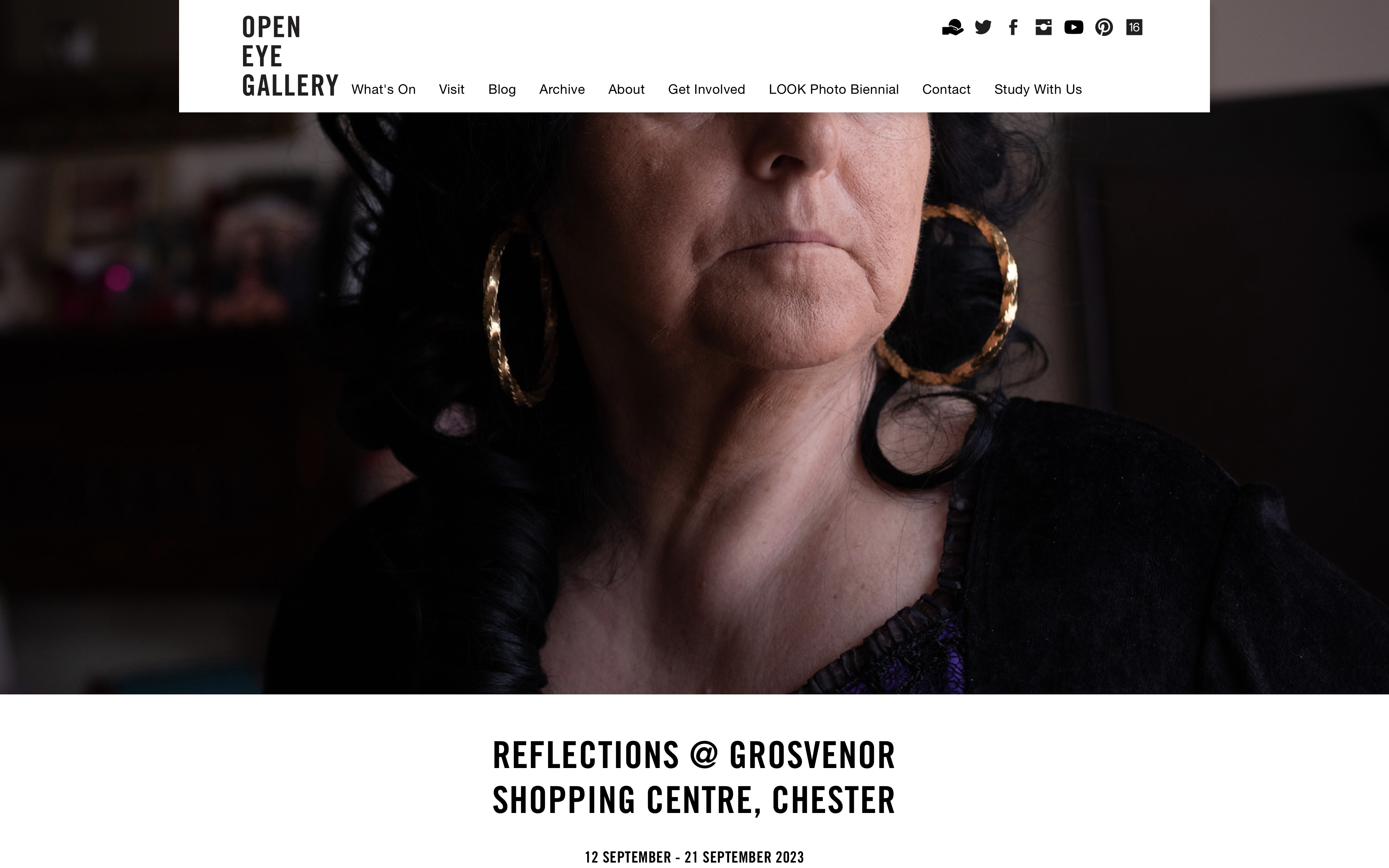Filmmaker Jason Lock produced a short film about the Reflections commission I worked on this year, along with parallel projects by photographers Sam Ivin and Tadhg Devlin. I worked with a small group of Traveller women to document the impact of the Covid-19 pandemic on their lives, while Sam worked with unpaid carers and Tadhg with people who live in rural areas of Cheshire West. The film can be seen here and you can explore my project, Got Through It, here.
pandemic
Reflections work at Open Eye Gallery
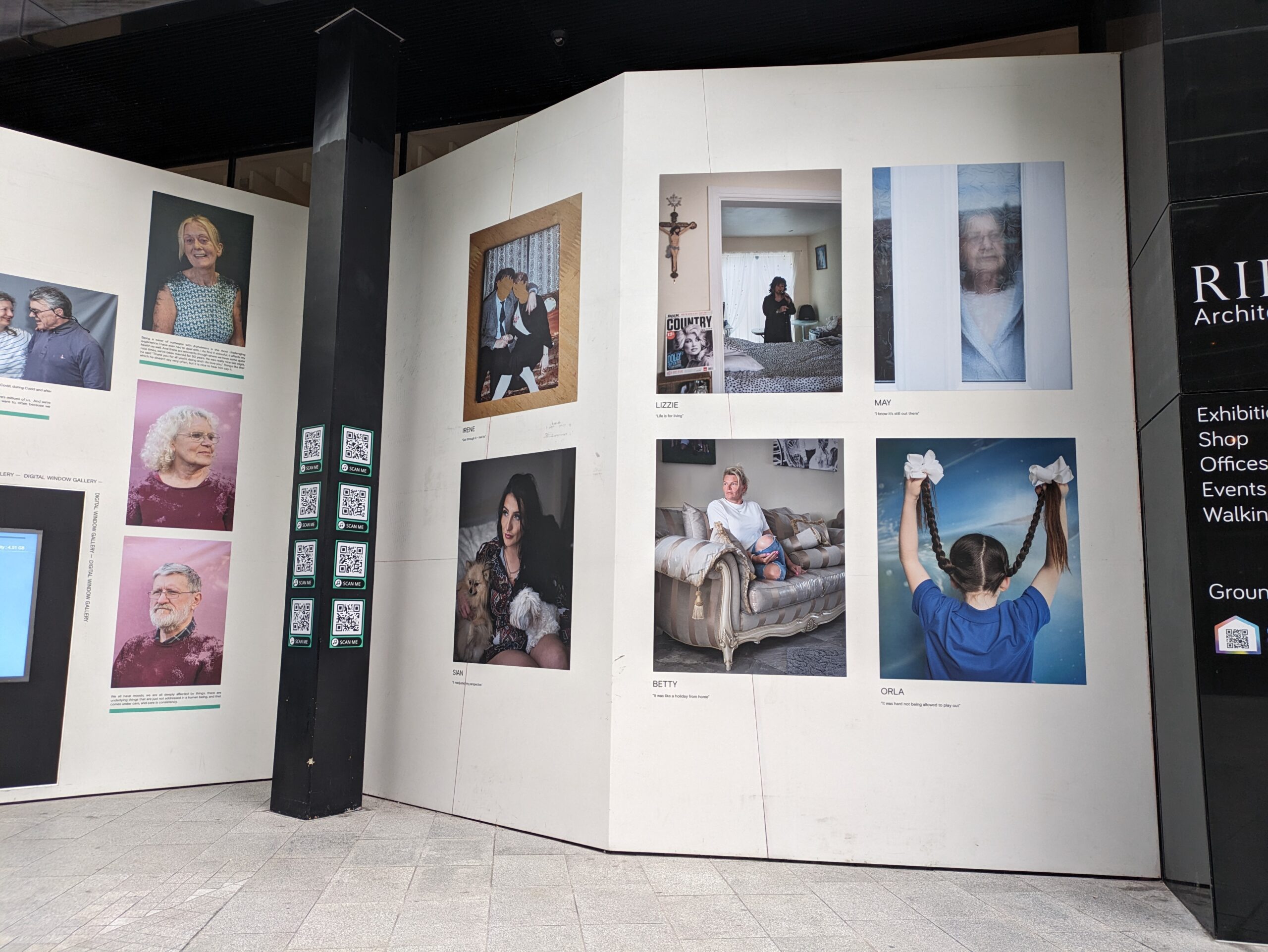 Work I’ve produced during the past year with women from the Traveller community is now on show at Open Eye Gallery, where it will be until 23 December, and it looks brilliant. Our work is only a small part of a much larger showcase of socially engaged projects – it is in the atrium area outside the gallery along with the other two Reflections commissions by Tadhg Devlin and Sam Ivan. Inside are another three fabulous projects from different areas of Cheshire and Merseyside.
Work I’ve produced during the past year with women from the Traveller community is now on show at Open Eye Gallery, where it will be until 23 December, and it looks brilliant. Our work is only a small part of a much larger showcase of socially engaged projects – it is in the atrium area outside the gallery along with the other two Reflections commissions by Tadhg Devlin and Sam Ivan. Inside are another three fabulous projects from different areas of Cheshire and Merseyside.
Of the people I worked with, only one was able to attend the opening night – disability and poor health prevented some of the others. But I’ve now given copies of the zine to everyone I worked with and am going to try to help those who are able to visit the show. I’ve also given copies of the zine to the various partners and individuals who helped me develop this project.
More info about the show here.
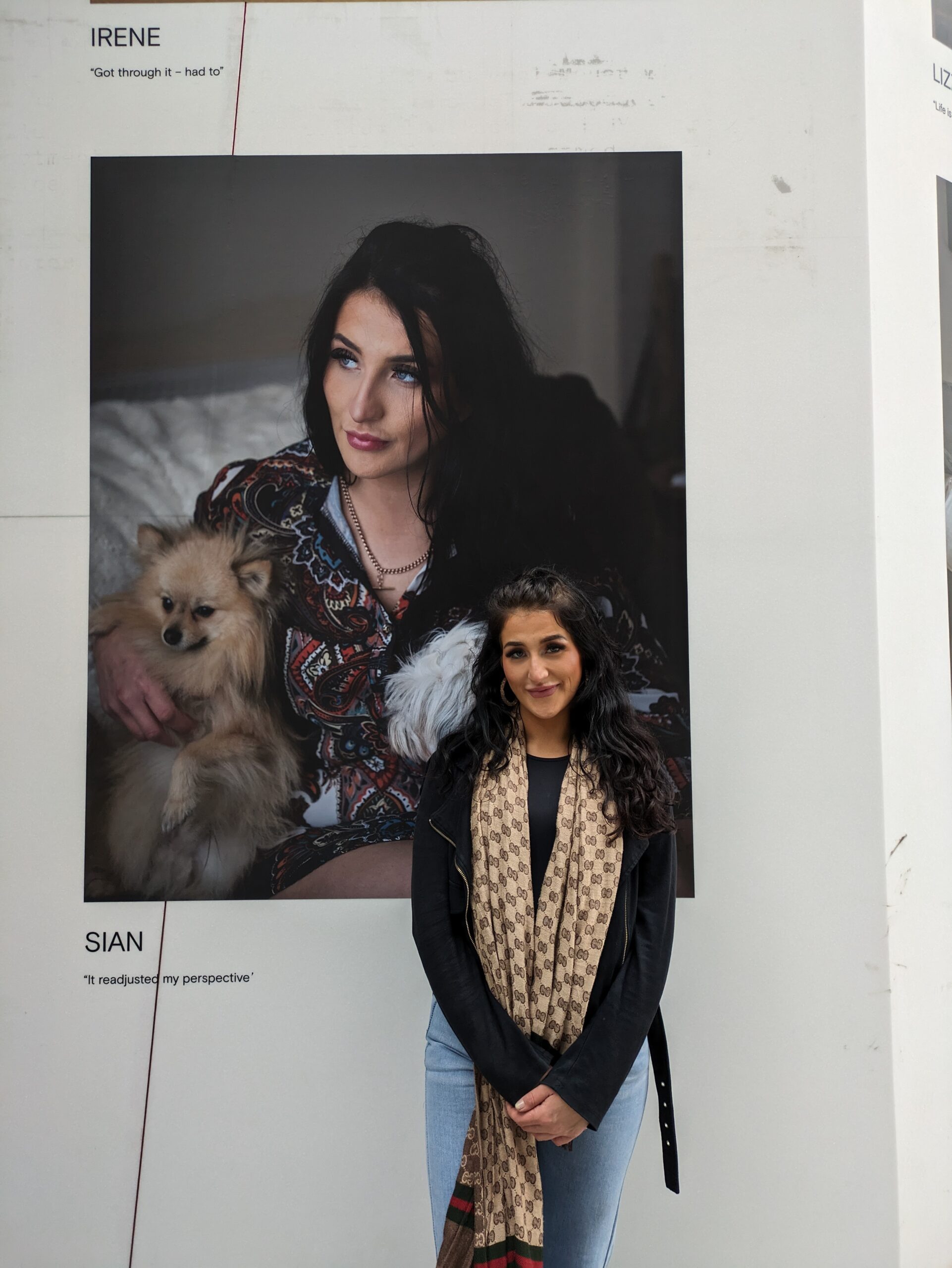
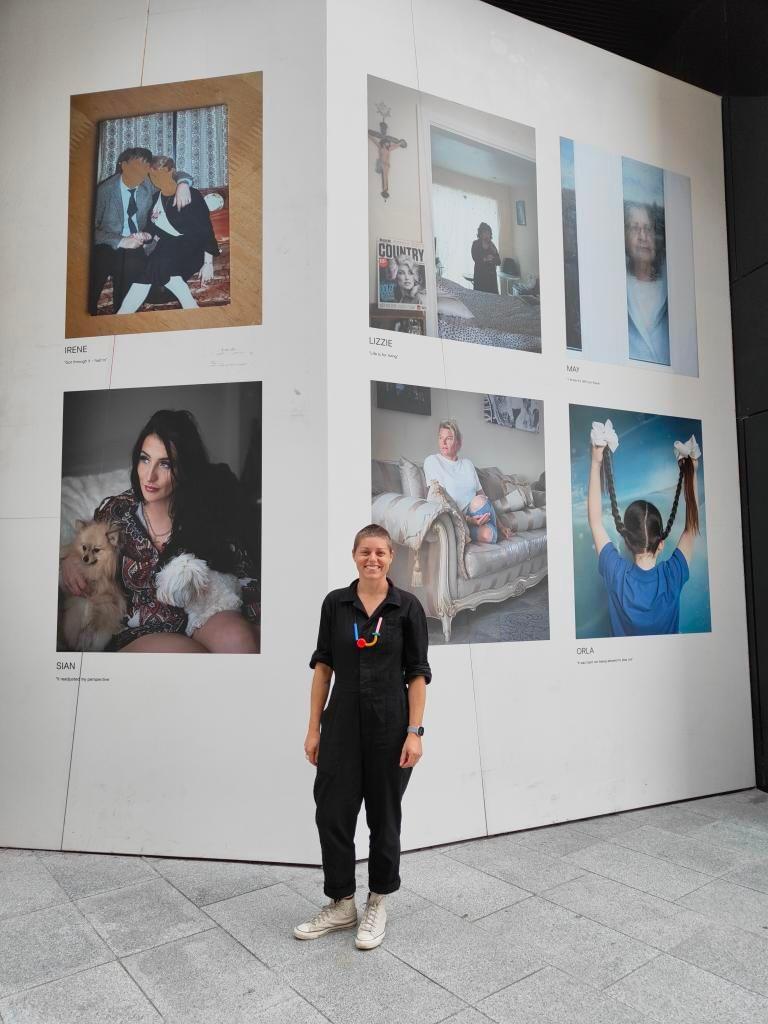
Reflections project – sharing
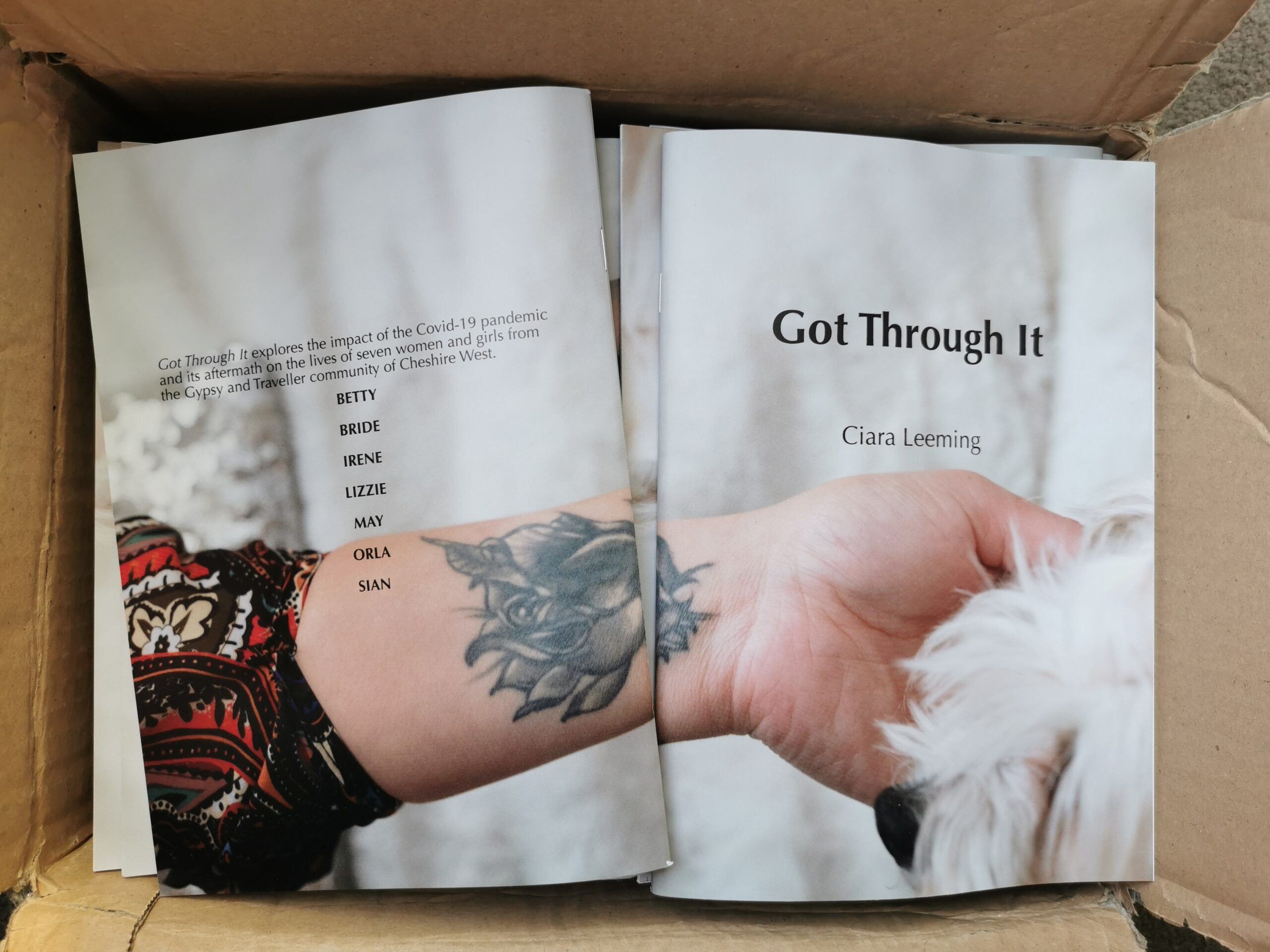
My Reflections commission with Gypsy and Traveller women is about to make its way out into the world – always a nerve-wracking moment for me. Are the participants going to be happy with it? Even though all who have audio have already listened to and approved it, and I read transcripts back to everyone, none have seen the finished zine which I have made and which features everything. I always have a nagging fear that someone will see the final thing and have second thoughts. Anyway, positive mental attitude!
I have printed a short run of these physical zines so will be giving copies to participants, partner organisations etc – hopefully I can do the participants next week. Fittingly, considering the pandemic-related theme of the project, I have just tested positive for Covid, so I’ll have to leave it for a week or so. Anyway, generally speaking the zine will be accessed digitally – it will be hosted on a dedicated project website which the council has built, and QR codes in the exhibitions will take people to it if they want to read more. You can also download it here.
The other online element to this project is audio clips featuring the voices of some participants. Again these will be linked to from the exhibitions using QR codes – you can listen here (scroll down to the pink section).
The first exhibition of work starts next week in Chester – and it’s a public-realm event featuring six images from me plus quotes and QR codes. I’m a fan of these types of interventions because I hope it will reach a broader audience than a gallery event. This is what I want my work to do – to hopefully show a more rounded image of Gypsy/Traveller lives and experiences. Later in the month a different set of images will be part of a group exhibition at Open Eye Gallery. More info about all of this here.
Reflections project – ups and downs
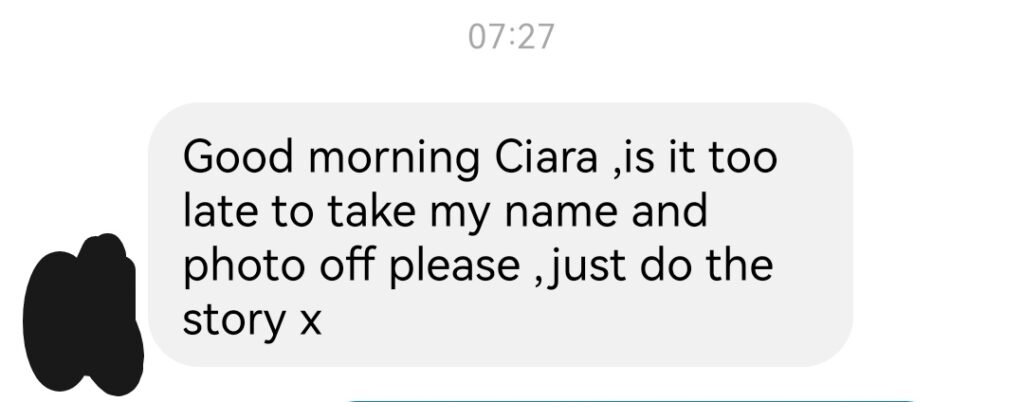
The process of informed consent is really important in socially engaged practice – this gives participants the right to change their mind and withdraw consent at any point.
I haven’t had people pull out of my projects many times before – ideally, we will have built up lots of trust along the way and I will have responded to any concerns which crop up – but it does happen occasionally.
This morning I woke to the kind of message I dread from one of my Reflections participants: “Good morning Ciara, is it too late to take my name and photo please, just do the story”.
This is a disappointment to me – because I happen to love the portrait I made of this participant, who was one of only a handful so far who had been willing to show their face – but it’s not the end of the world. Their words remain very powerful and they are willing to let me use their voice, which I have recorded and turned into short audio clips. I have alternative images to use alongside their words, which are non-identifiable.
The egotistical photographer within me wanted to use the beautiful portrait, but I’m having to remind myself that this process is not about me. A consent form is in some ways a starting point – the relationship of trust which I create with participants is far more precious and something I view both as a privilege and responsibility.
I have worked with Gypsy and Traveller community members before but never in this socially engaged way – where I’m working one to one with individuals over periods of many months, and talking in-depth about their personal experiences.
My previous work (from 2009-14) was documentary – I mostly tagged along to family events and had conversations along the way. That work was independent and self-funded – and there was none of the baggage of exhibitions and archives and local authority power dynamics attached.
Perhaps people back then were also more trusting of the camera – I feel the explosion of social media in the past decade has made everyone much more wary these days, including members of these communities. After all, the mainstream representation of these groups has always been – and continues to be – extremely negative. Who could blame the majority of individuals for being wary of nosy outsiders and their cameras?
During the Reflections project so far, I have had many ups and downs. I’ve had numerous introductions to and conversations with people which have ultimately gone nowhere – but which all added to my understanding of people’s experiences of the recent past.
I’ve worked intensively with five participants so far and hope to connect with one or two more before my engagement wraps up this summer. But it’s been challenging at times to pin people down to visits – life gets in the way for people (myself included) and I’m mindful that I’m working with people who have, frankly, a lot more important things going on. There have been extended hospital stays, deaths in families and other emergencies, along with childcare responsibilities and family holidays.
I have also had concerns to allay about who will see the work and how to protect participants’ identities – this seems to sometimes be as much to do the internal gaze (what other community members may think) as the external gaze. There are sensitivities and complex dynamics around this work that I may never fully understand but I’m doing my best to represent people in a way which feels comfortable to them and true to their experiences over recent years.
End of an era – closure of Big Issue North
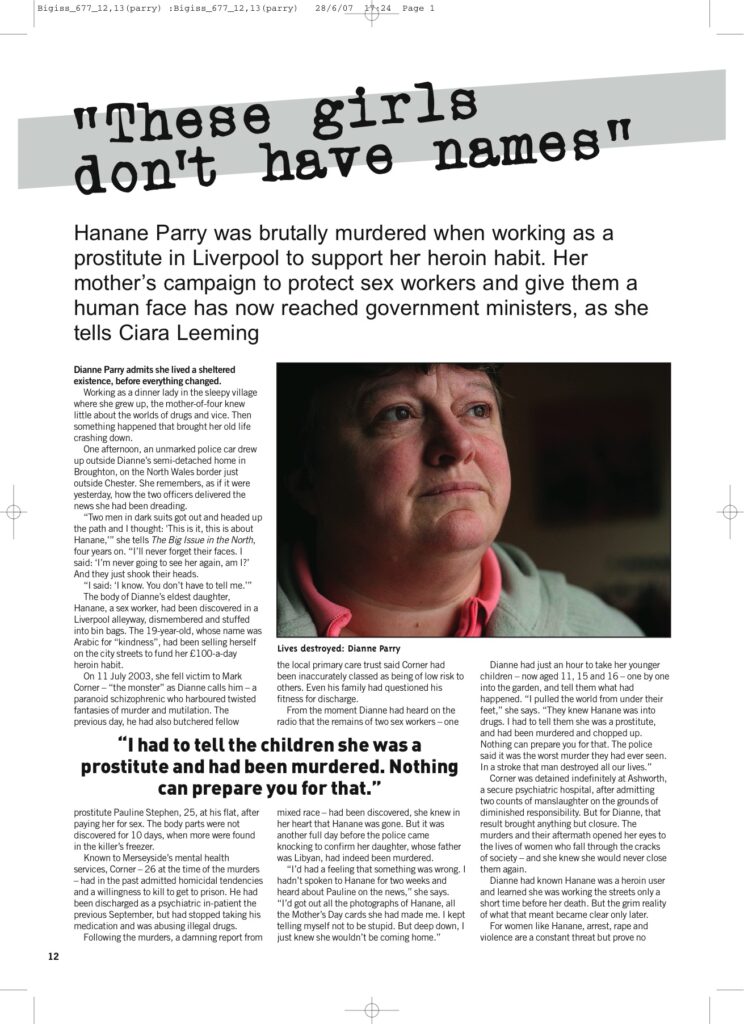
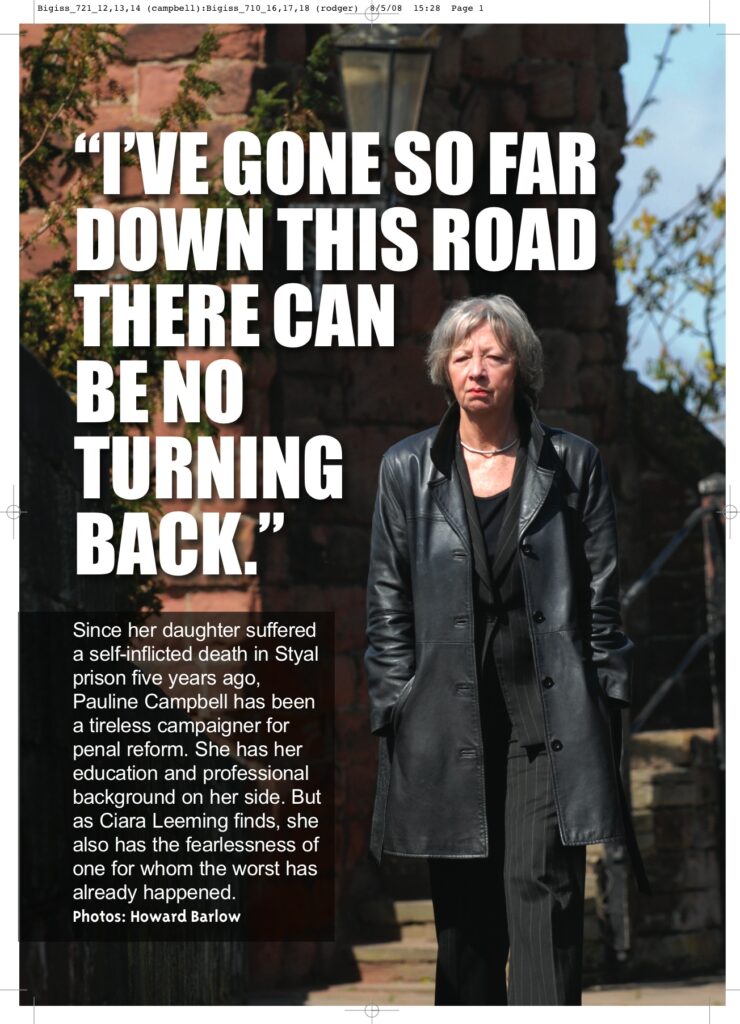
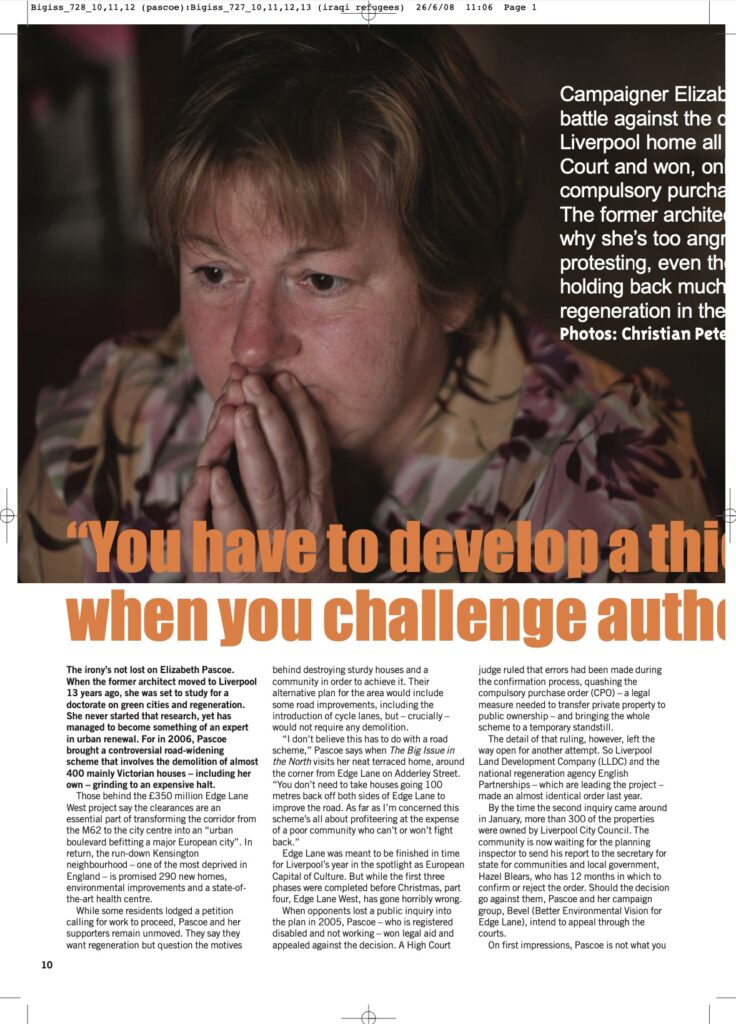
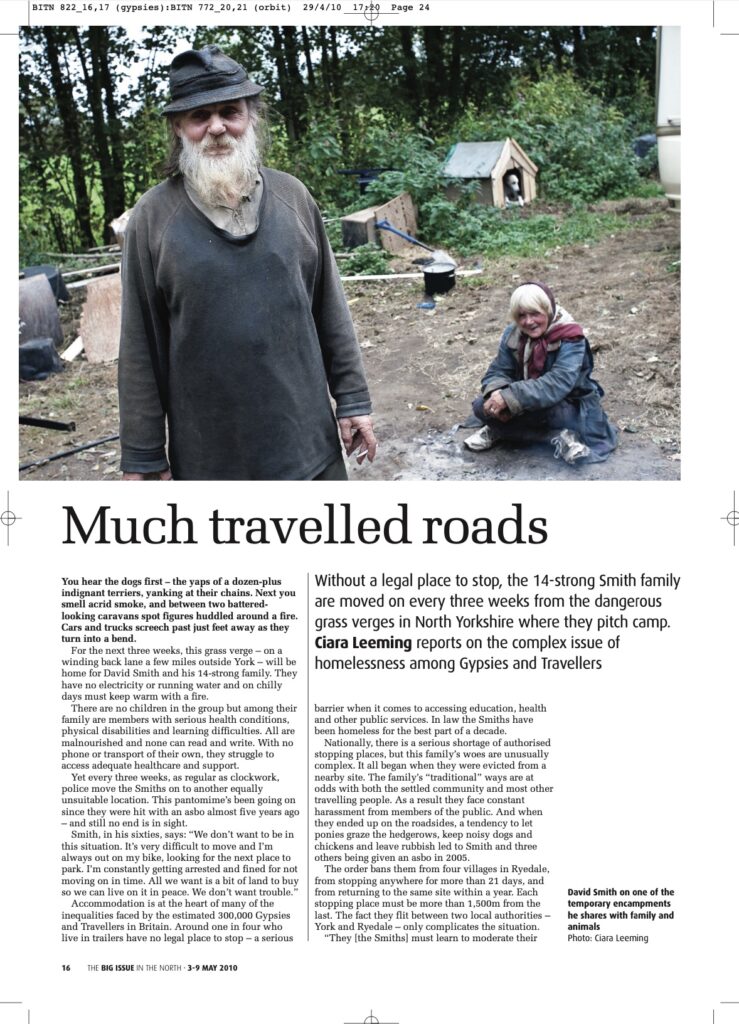
I’m gutted to hear Big Issue North magazine is closing down – I was a freelance contributor to the mag from 2006-21 and have a lot of affection for everyone there.
Its closure is sadly the way things are going in the media industry – in some ways it’s surprising it’s lasted this long: the internet/social media, the decline of cash, then Covid and a cost of living crisis.
I’m really grateful for the opportunities the magazine gave me as a young journalist who was thrown into freelancing when I was made redundant after just 2.5 years experience, when the start-up newspaper I was working for suddenly went into administration. There were no staff opportunities in in the print media up here back then – Media City did not exist – unless I wanted to go back into small local newspapers (I didn’t). All the bigger regionals were making redundancies. I had no connections in London and in any case I was rooted up here. I found it hard to make any headway into freelancing for the nationals and in the end gave up trying.
Big Issue North was a lifeline to me – as one of my fellow newly-redundant colleagues, Kevin, was appointed editor there, the magazine suddenly opened up to me as a place where I could follow my interests. He indulged me as I developed bodies of work on urban regeneration across the North of England, social affairs issues and the newly arrived Roma communities in our towns and cities. They said yes to much of what I pitched. When I discovered photography a few years later, they were the first to publish my images. And when I was trying to figure out how to develop a photographic project with members of the Roma community, I eventually found my first collaborator, Ramona, through the magazine – which she was then selling on the streets of Rochdale.
Even though I’ve moved on from being a journalist – I last worked for Big Issue North in early 2021 – I really feel quite sad about today’s news. So many publications I worked for during my career have closed down. Things change but it’s a real shame the northern content in the Big Issue our vendors will sell from now on will be so hugely diminished, and opportunities for local journalists shrinking even more.
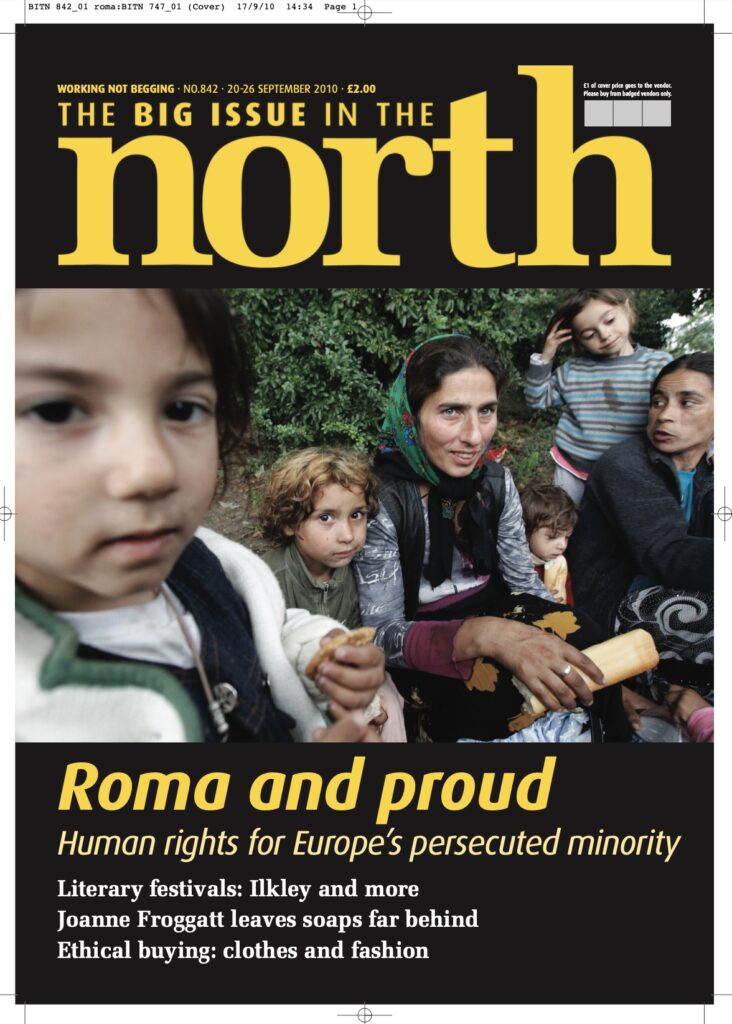
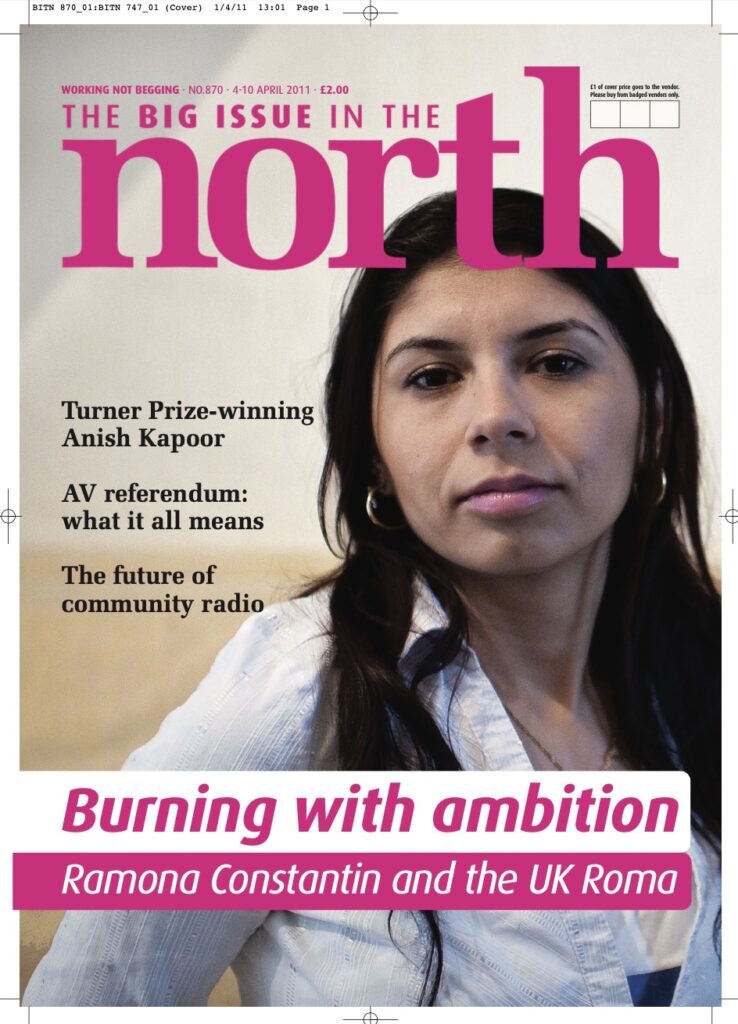
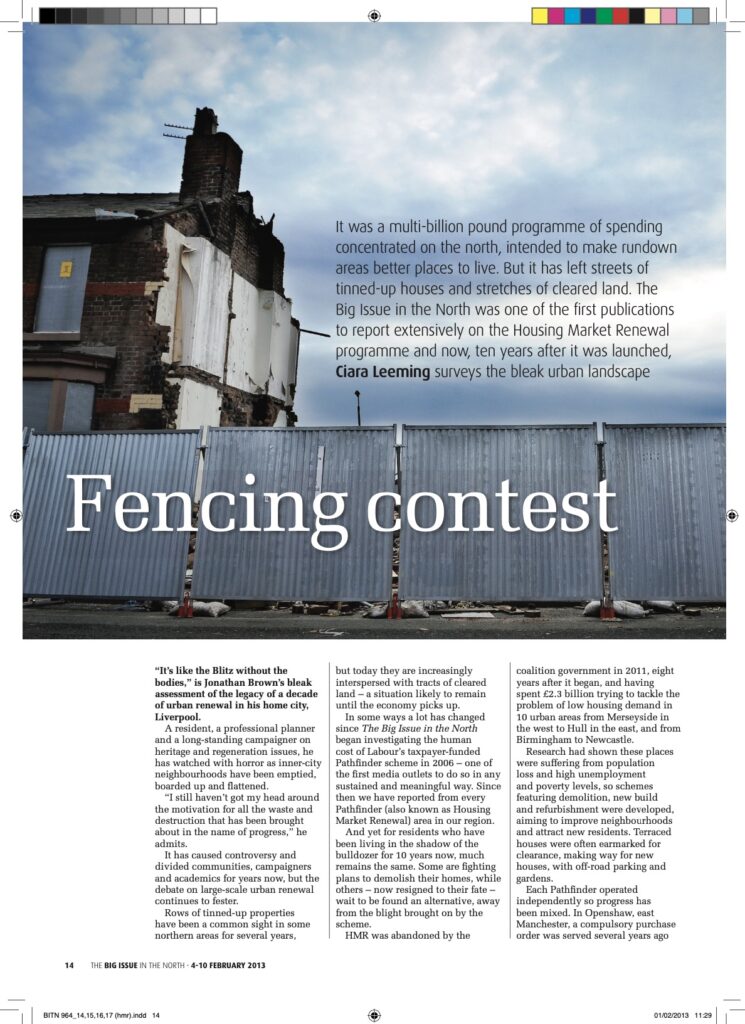
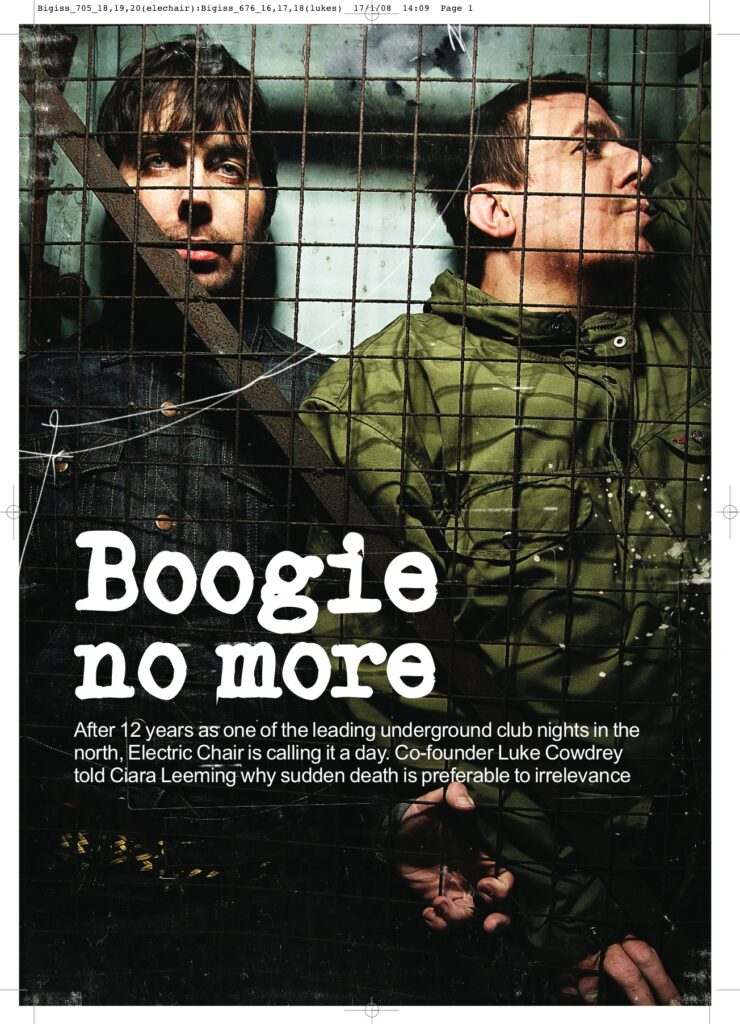
Goodbye 2021
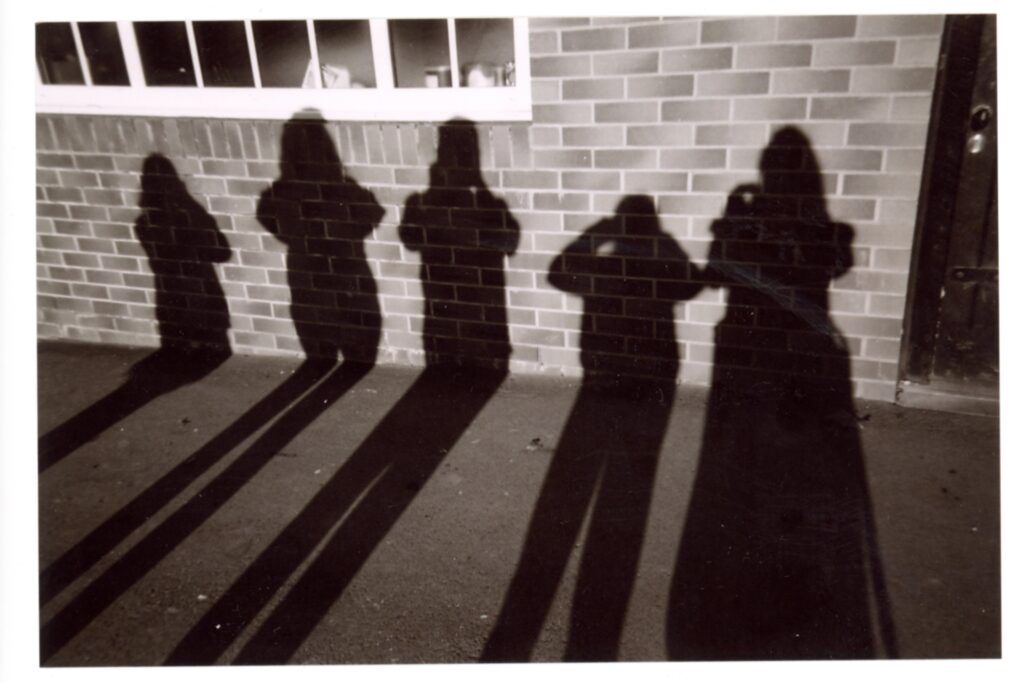
2021 has been a mixed bag personally and professionally. Aside from the obvious awfulness of this pandemic, there’s been a lot of loss.
My kids lost three grandparents in quick succession over late 2020 and the first part of this year, following long periods of illness and decline – a situation made all the worse by the limitations to visiting etc. A number of friends have also left the area and in some cases moved abroad, which for me has compounded this feeling of grief and loss.
I felt very at sea professionally earlier in the year but eventually started to realise that one of the things I was feeling was profound boredom. After 16 years as a freelance journalist, basically writing the same stories for the same outlets and feeling inferior every time I looked up my NCTJ peers (why do we do this?), maybe it was time to shift focus. This felt like a failure initially but I soon came to frame it differently.
Taking part in Crossing Sectors, a professional development programme put on by Open Eye Gallery, helped with this. It led me to run a socially engaged lockdown project in my neighbourhood, then to apply for Arts Council Develop Your Creative Practice funding – which I didn’t get but the process moved me forward significantly. That application then formed the basis for several other applications for arts commissions and I started to see some results. I got to the interview round for a project in a prison – which felt like progress.
Then I won a microcommission from Open Eye to make collages using litter I’d picked up off the floor – the first time I’ve used any kind of alternative media within my work. It felt like an outlandish thing to propose but somehow it worked. From there the good luck continued. I got on another training programme with the Turnpike in Leigh, the Making of Us, which has paired me with a talented young designer and 3D printer to design and deliver a series of workshops to five teenagers in a special school. We’re part way through this at the moment and it’s been a huge learning curve – you can’t get much more out of my comfort zone than this.
Aside from this I’ve got another two socially engaged commissions which are at an early stage – a Heritage Action Zone project in Chester with Open Eye Gallery, where I’m going to partner with the Spider Project, and another similar but bigger scale project in Wigan, where I will be working with community members to consider the history of King Street. That one is something I’m quite nervous about at this stage as it’s all such an unknown at this point, and there are two other artist commissions happening co-currently along the same short street.
Running in parallel with all this is my involvement in Post Photography Collective – a group of mother photographers who share lots of experiences and frustrations. We only meet on Zoom once a month but having a network of like minds has been a lovely and positive thing.
Additionally, I spent this term working as an associate lecturer in photography at Manchester Metropolitan University, supporting a small group of students to engage with the community of Clayton. This happened completely by chance, through a chat with the course leader at an open evening at an artist studios near my house. I don’t know if my contract will be renewed or whether the other projects will allow for this next term. But it’s been a good experience overall.
I don’t know what the point of writing this is, other than to remind myself of how much has happened in a relatively short period of time. I don’t think I’ve really taken many photos of my own, other than the litter portraits which then got turned into collages. One of those will be in the Manchester Open exhibition in late January/February.
But I suppose the thing that is worth remembering is that all of these professional changes have happened just months after I felt really bleak about my direction. It took me months to change the wording on my website and social media from ‘journalist’ to ‘former journalist’ and sometimes ‘writer’. It felt like a huge admission of failure but actually I’m quite pleased and surprised with the turn of events.
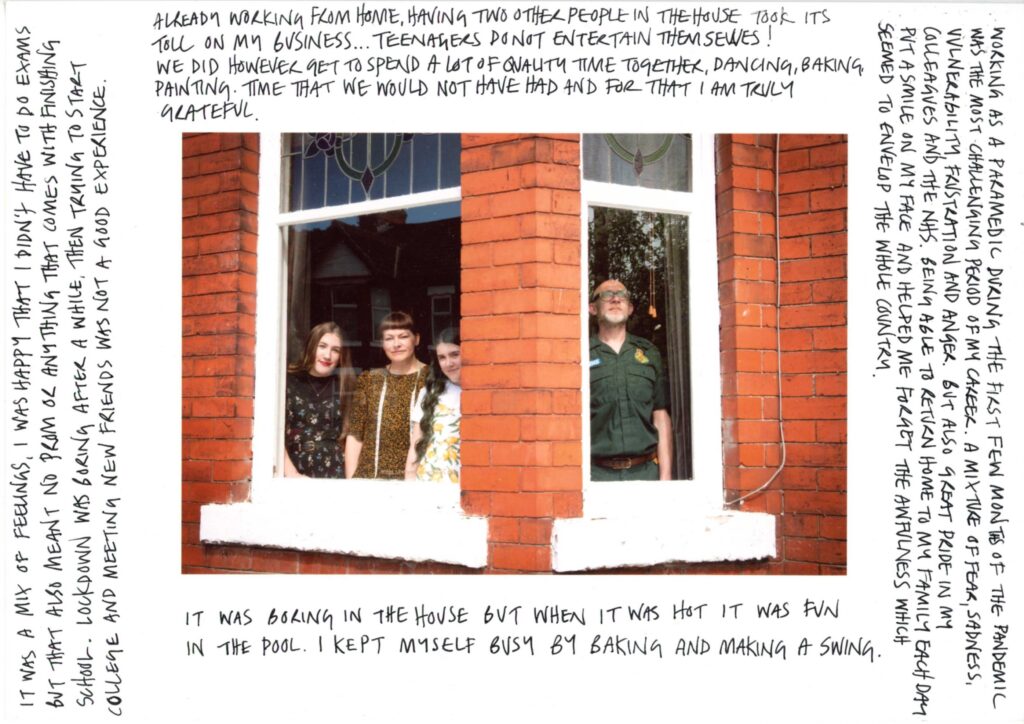
Lockdown reflections
A few more lockdown book participants have reflected on the past year for me… see the full set over here.
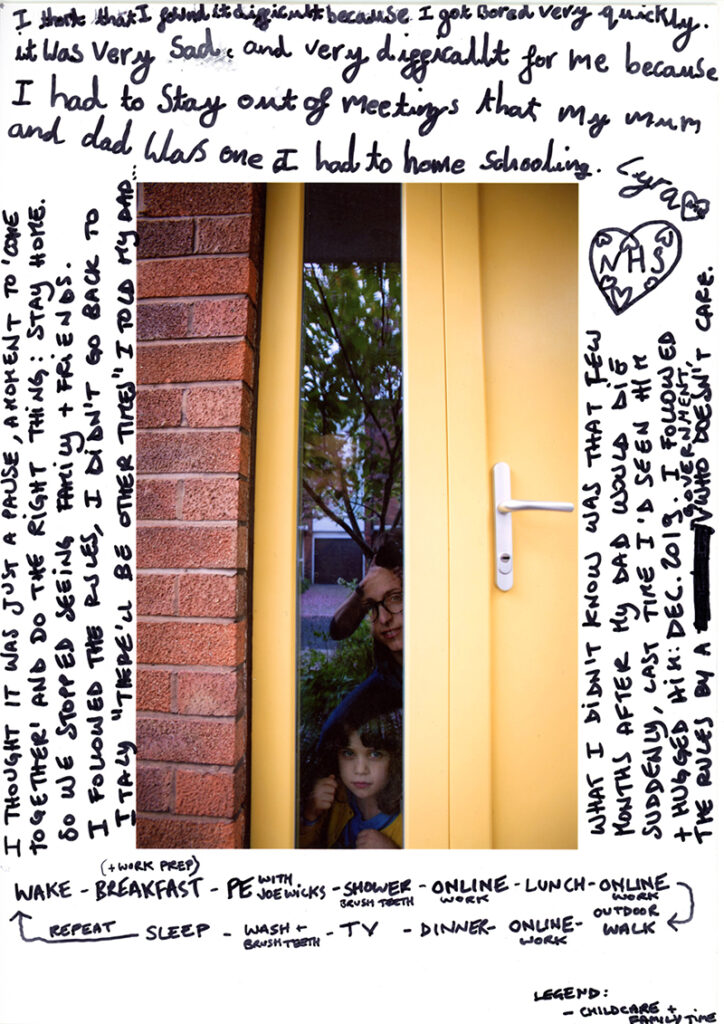
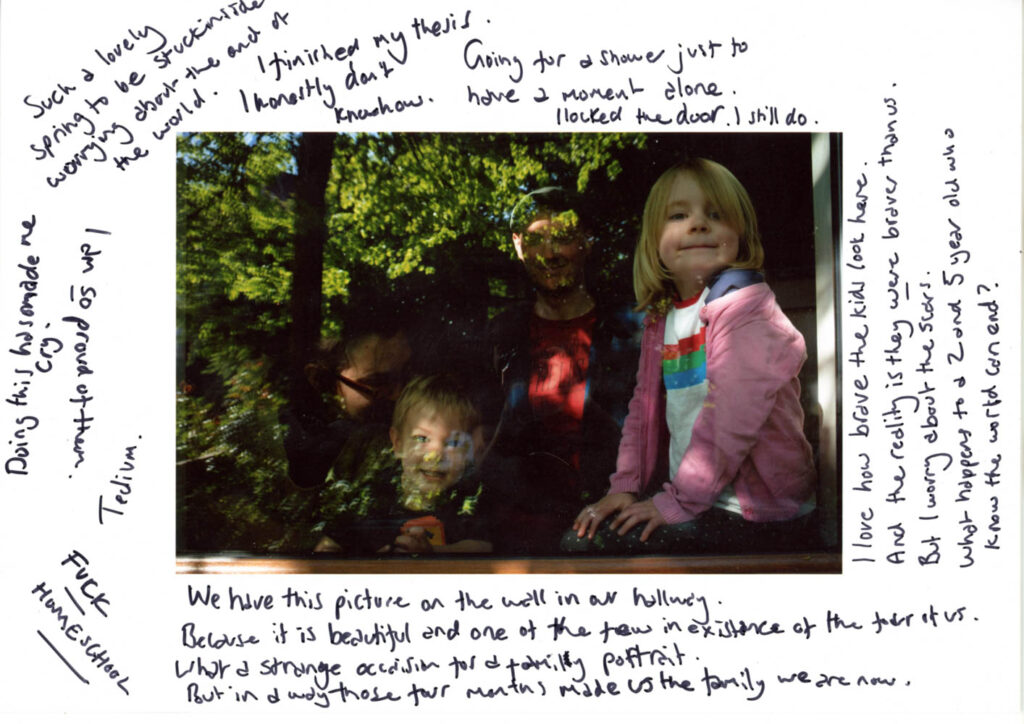
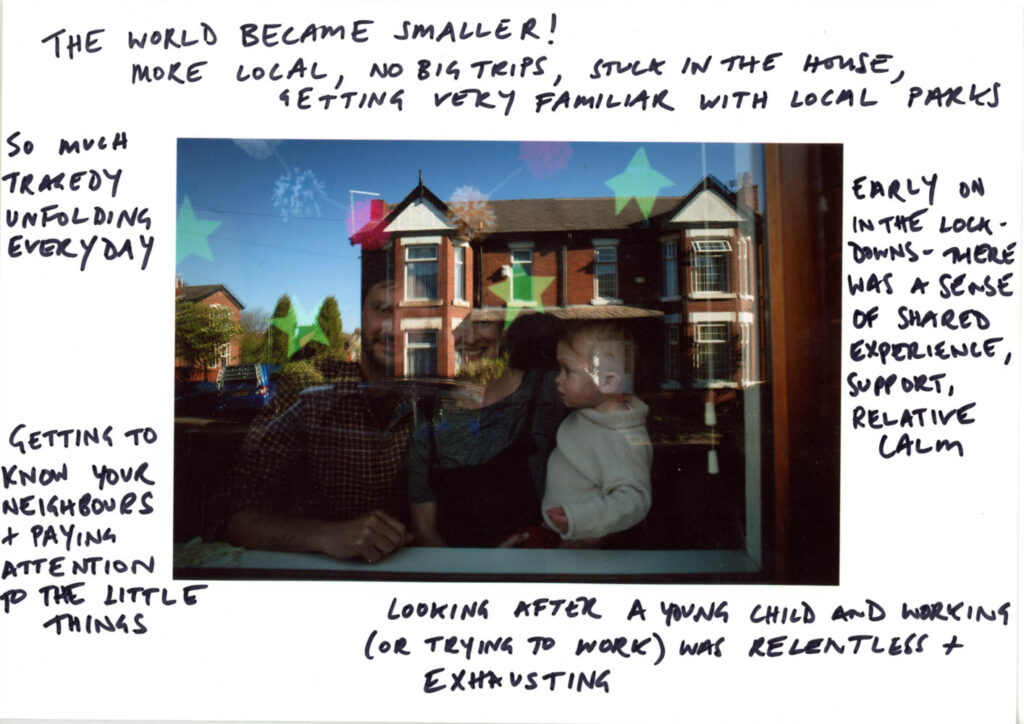
Pandemic reflections – Levy Lockdown Portraits #2
A year into the pandemic, I invited a number of people who I’d photographed for Levy Lockdown Portraits to reflect on their experiences of the past 12 months. Here is what they wrote:
New term, fresh start and the Making of Us
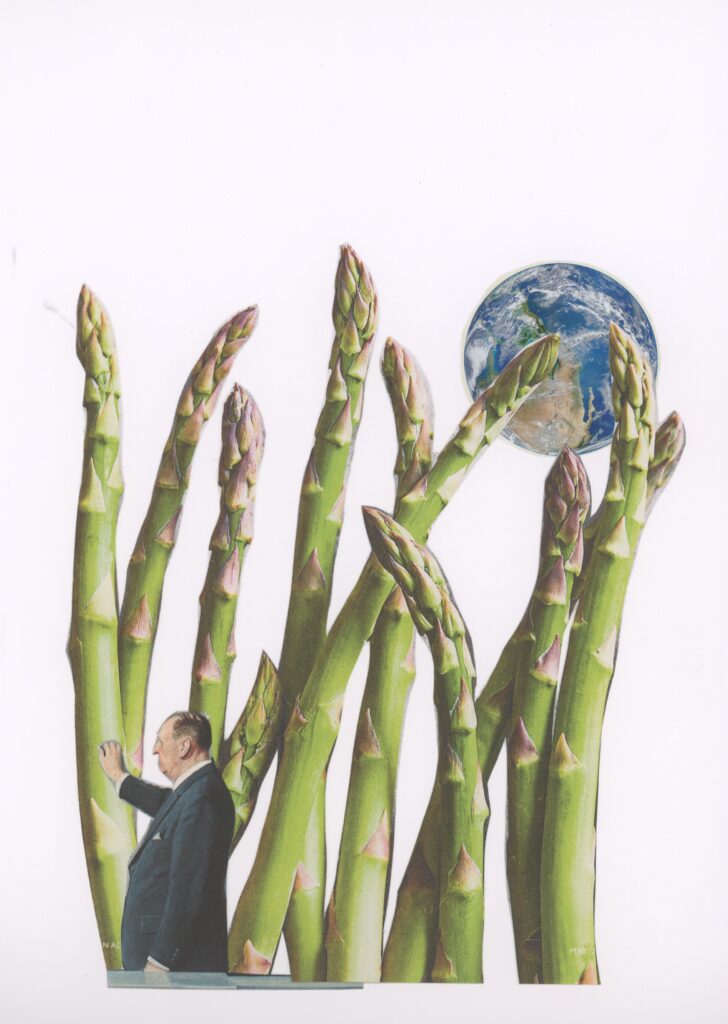
School returned last week, which means I’ve had more breathing space over recent days than I’ve had in months. For me too, it feels like a new beginning. This year, amid the chaos of Covid, home-school and grief, I’ve realised a few things. I’ve felt my identity shifting somewhat and have come to terms with the fact that my professional aspirations have changed.
I’ve been a journalist since 2004. Throughout that time it’s been a huge part of my identity, with an unhealthy level of my self-esteem and self-worth wrapped up within it. I think it’s that kind of job to be honest. That’s something I realised for the first time when I took maternity leave – that I wasn’t sure who I was once that part of me was stripped away.
I’ve had two parallel parts of my career since about 2008, when I started taking photos quite seriously and working on personal projects about the kinds of issues I already covered as a writer – regeneration, migration and so on. The more creative part was something mainly for me to be honest, I never really tried to get any of it published in the traditional sense and was quite happy making the work and putting it out there independently. The bit I enjoy most has always been the research: finding people, earning their trust, asking questions and making photos.
I think I expected to always carry on in the same way – writing for the likes of Big Issue North and working on independent projects, albeit hopefully with some grants to help me financially. But I think the pandemic and everything else which has happened in the past 18 months have had an impact on me. I realised I needed to do something different – that I was bored. I’m not bored with the subject matter or the people I meet – I still love all that. I think I’m just ready for a change – I’ve been working in the same way for the same clients since I went freelance in 2006, which is quite a long time. Even thinking about working up and pitching a story gives me an exhaustion headache at this point. It’s a physical feeling.
Even writing this feels a little dangerous… what if I change my mind?! Well, I’m not saying I’ll never take freelance journalism commissions again, I’m just taking a break for the time being. But arguably, I’m not going to be doing anything hugely different than before, just coming at it from a new perspective and with a new, more community-focused approach.
Earlier this year I was part of Crossing Sectors, a professional development programme for artists run by Open Eye Gallery which aimed to help us work in a more socially engaged way. This was like a breath of fresh air for me – if I hadn’t admitted to myself that I was sick of being a freelance journalist at the start, I was by the end. This programme informed the way I put together Levy Lockdown Project – a community effort to document the pandemic and the way it has shaped our lives – and I then went on to receive a micro-commission from Open Eye, which allowed me to use participatory methods to examine the issue of litter. I put in what I considered quite a mad proposal – which would see me make collages using litter – and didn’t expect to be selected. Not long after I was also offered a tailor-made residency as part of a big Historic England project I’d applied for, despite being almost certain I was unqualified. I would never have imagined to have this kind of run of luck at the start of the year, when I was feeling quite demotivated and fed up. Even a recent unsuccessful Arts Council Develop Your Creative Practice application has failed to bring me down.
One of the most exciting things I’m part of at the moment is called the Making of Us, which is another artist development programme, running from the Turnpike in Leigh. For me this feels as if it will build on what I learned with Open Eye. Over the coming months I will be part of a multidisciplinary group of artists who will work together on becoming better socially engaged practitioners and then be paired with organisations to develop a programme which we will deliver to groups of service users. The idea is that what we do is responsive and as socially engaged as possible – rather than us coming in with eight pre-prepared workshops at the start of the programme, we will reflect on their interests and needs and try to work with them to deliver something which works for us all. Workshops are definitely something I am a bit nervous about so this kind of handholding is exactly what I need, and it’s all very exciting. I haven’t felt this enthused for ages – which confirms for me that I have definitely been in a rut and in need of a change.
Levy Lockdown Project – socially engaged project website
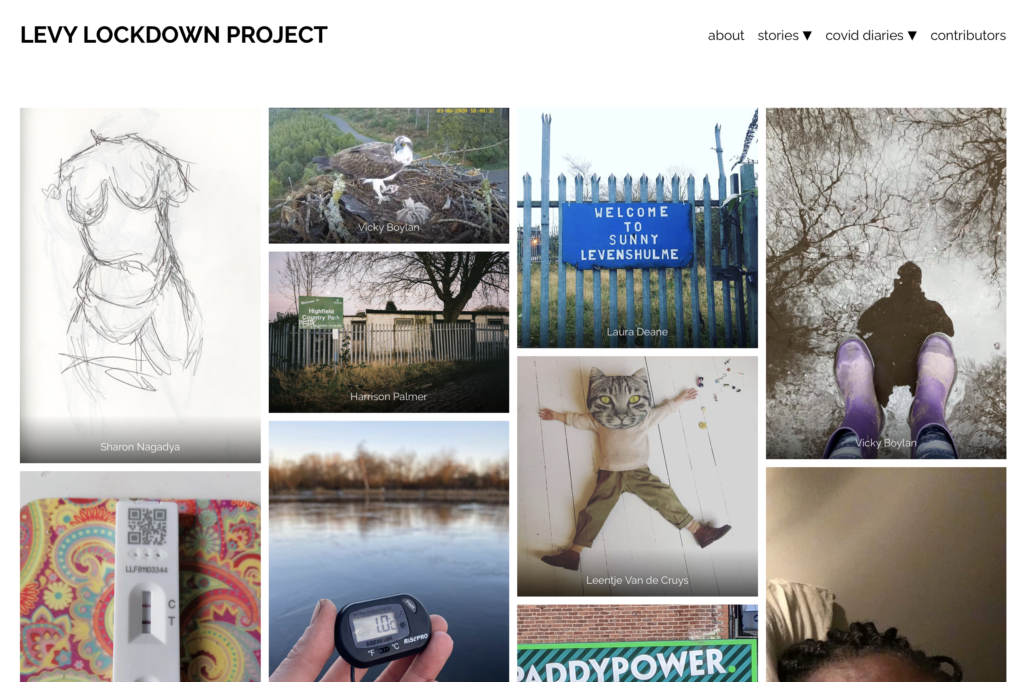
Since January this week I’ve been working on a loose socially engaged project in my neighbourhood of Levenshulme, where I’ve invited local residents to send me their thoughts and images relating to the past year and how Covid-19 has impacted their lives.
This was funded via an InterMEDS commission which I’d been awarded by Peshkar in Oldham early in 2020 – pre-pandemic, my proposal had been to run a participatory project with Roma young people, but this plan naturally had to evolve as the world shut down. Gone were the opportunities to work face to face – instead, and inspired by my experience on Open Eye Gallery’s professional development course, Crossing Sectors, I turned my attention to my immediate community and tried to build on the network I’d developed through last year’s work on Levy Lockdown Portraits.
Over the Christmas holidays I handed out some creative kits to six local women – including disposable cameras, journals and some prompts. The timing ended up being quite fortiutous as we soon found ourselves in our third national lockdown – a bleak time where it felt dark and depressing and where all schools were closed for the second time.
Participants had a lot to say about what was going on – and I realised there was no reason why I couldn’t open out this to more people. So I set up a little Facebook group and put an open call on instagram and people started sharing work. In June I put together a zine featuring 36 people’s contributions but there was still more to see, so I’ve now pulled it all together into a website, Levy Lockdown Project.
This features everything I was given during this period – from full on journals, to photos and sketches. 42 people are on there and I have no work there except as a curator/facilitator. There are also a few audio interviews which I’ve conducted with three of the original creative box participants.
I’m pleased with this work – its my first true socially engaged project. I’ve learned a lot – it’s been quite a loose project with no workshops and most of the interactions have been digital, but I think it is an interesting community archive and a lovely companion piece to last year’s window portrait book and our zine.
Thanks to everyone who got involved and shared their thoughts and work. And thanks to Peshkar for the commission, and to Eurasmus and InterMEDS for the funding.
